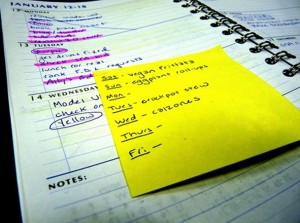Simple Menu Planning For Everyday Eating
 Can you relate to this?
Can you relate to this?
♦ No menu planning so you often don’t know what to make for dinner.
♦ Frequently get expensive, high calorie take out.
♦ No food budget, you just know you spend a lot and find organizing food too confusing.
♦ Meal preparation is time consuming and stressful and seems like a lot of work.
♦ These scenarios are more common than you think
Disorganization around food and kitchen can be one of the most time consuming and expensive household habits.
The solution is simple. Make a menu plan to organize your grocery shopping and food preparation. Get organized in the kitchen.
Why menu planning works
- A menu plan saves you time every single day, seven days a week.
- It saves you shopping, cooking and cleaning time.
- It only takes about fifteen minutes to fill out; you can organize all the meals and fill out your grocery list for the week quickly.
- You know what is for breakfast lunch and dinner and you can thaw or pre-make the food that you need.
- You know exactly what to buy. When you fill out a meal plan and grocery list weekly you soon learn what are the basics for you familyand what changes week to week. This makes food planning, your grocery list and shopping even easier.
- You buy what you need for the week and reduce the impulse spending.
- You have more cupboard space because you can discard what you never use and you don’t multiple buy.
A menu plan saves you money
- Working with a menu plan and a detailed grocery list so you buy everything you need in one shop. Fewer trips to the grocery store mean more money in your wallet.
- You waste very little food and find you are saving anywhere from 30 to 100 dollars a week.
- With menu planning you plan what you buy and you can take advantage of sale items and cheaper bulk buys,
- You find you become immune to impulse buys
- You reduce food waste as you only buy what you need for that week. Every bag of groceries thrown out can cost between 30 and 50 dollars.
- And finally a good menu plan let you make a detailed grocery list taking away stress of the grocery shopping and making meals.
Basic Menu Planning
Keep it simple
Work with a structure. You can use a Calender page on the computer or a menu planner from Monday to Sunday with slots for breakfast, lunch, dinner and snacks.
Fill in easiest meals first
Breakfast is often the simplest meal. Write your standard breakfast food and fill in your grocery list with what you need for those meals.
Always simplify your grocery list.
If you usually have five cereals in the house think about buying two and rotating cereal from week to week. Simplfy the amount of products you have in your kitchen.Buy three cheeses try two and use one for two meals. Declutter your salad dressings and condiments and have one or two of these products in your home.
Identify the basics: the repeat buys for everyday eating
Lunch usually consists of sandwich basics. So you know that you need a certain amount of bread, sandwhich filling, fruit and whatever else your family likes for lunch for the week.
Take a survey and find out what kind of lunch food your family likes to eat.
Estimate the food amounts for the week so you don’t overbuy and fill in your grocery list.
Get into a food planning/cooking routine
Making dinner becomes easier when you get into a routine.
Assign meals for certain days. Monday can be pasta, Tuesday day chicken, Wednesday Beef, Thursday finish leftovers, Friday can be a stir fry and Saturday is Pizza with Sunday a roast.
I like to keep one day a surprise dinner so I can leaf through my favourite recipe books and pick out a favourite meal to make.
Also plan for one or two meals that use leftovers for dinner or ask who likes dinner leftovers for lunch. This means you only plan for five or six dinners and one or two leftover nights.
Decide what style of meal suits your time frame.
Plan easy, quick meals like pasta on the days you are tired or busy and meals that may take a little more prep on the days you have more time.

